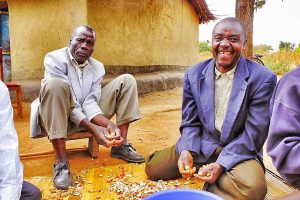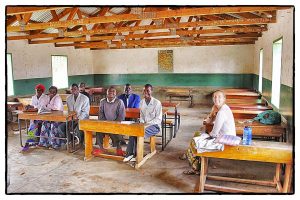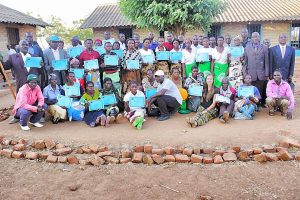This project is made possible through the partnership of Water Charity and the National Peace Corps Association. ![]()
Location
Kamsonga TC, Ntchisi District, Malawi
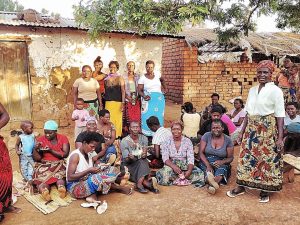 Community Description
Community Description
Ntichisi is a district in the Central Region of Malawi with a population of 212,000 and a land area of 1,655 sq km which gives a density of 128 persons per square kilometer. The district receives an annual rainfall from 900 mm to 1,500 mm.
Agriculture forms around 80% of the district economy where 14% of cultivable land are estates producing mostly tobacco with the remainder of smallholder farms producing a range of crops such as maize, beans, groundnuts, potatoes, and cassava. Livestock, forestry, and irrigation are also important activities in the district. There is little private industry in the District and Government is by far the largest employer. The poverty rate in the district, according to Profile of Poverty in Malawi, 1998, was 76.3%
This project is being initiated, planned, and implemented by a community development group called SOLID in coordination with a local Peace Corps Volunteer.
Problem Addressed
The problems being addressed by this project is lack of water, community development, computer and writing skills, as well as malnutrition.
Project Description
This project involves the building of three new wells, the installation of 13 rainwater harvesting systems, and irrigation of a number of community gardens.
Three village wells will be dug and lined with bricks, using local labor, with the intention of securing year-round access to a reliable and clean source of water.
The rainwater harvesting portion of the project will supply SOLID Members’ households with a rainwater catchment system in 6 villages in the area of Kamsonga. Each system will consist of gutters around the house to collect water, attached to a piping system that runs to a 1,000-liter plastic tank.
The water that is collected during the rainy season, along with the constant supply generated by the three new wells, will help supply water, during the dry season in order to sustain home perma gardens and tree nurseries in the households of the SOLID members and their surrounding neighbors. The hope is that the technology will be replicated by other community members to apply the new technology, once they see how beneficial it can be to their household.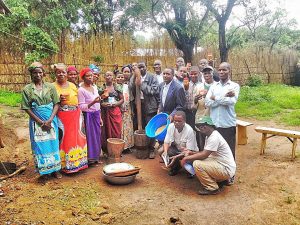
The project is designed with materials that are accessible and attainable for people at the community level: cement, plastic tanks, and metal piping. The majority of the funds will be used to obtain the materials necessary to establish a rainwater harvesting system. The SOLID members have been planning and working hard to secure their own finances through a peanut butter IGA in order to support and sustain this desired project.
After the rainwater catchment systems are built, then the action plan to establish Perma gardens and tree nurseries will be put into place. In addition to learning about proper water management, SOLID members will be trained in the proper development of a Perma garden and how to establish a tree nursery. Furthermore, all SOLID members will be expected to establish one or both of these environmental practices and will be held responsible by the plan of monthly monitoring at their homes. The positive impact will motivate the greater community to adopt these practices in their homes.
Project Impact
2,070 people will benefit from the project.
Peace Corps Volunteer Directing Project
Amanda Larson
Monitoring and Maintenance
Community forestry officers will be placed in charge of monitoring tree nurseries and gardens. SOLID members will monitor the water catchment.
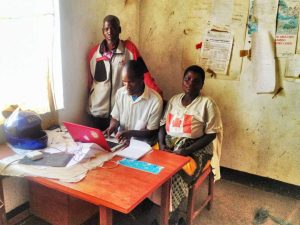 Comments
Comments
After SOLID completed training the locals on water issues and rainwater catchment, in November 2014, SOLID Volunteers were anxious to apply what they had learned in order for them to have the tools, connections, and finances needed in order to make the water project a reality for their local communities.
SOLID Volunteers began working on computer skills so that they could eventually write and submit funding proposals. As they continued to practice this skill, they developed a Peanut Butter IGA in order to fund community development projects.
PCV Amanda Larson, and Salome Mumba of SOLID, a water engineer who lives and work with the Ministry of Agriculture as well as various NGOs in Lilongwe, have designed this project. With Salome Mumba’s insight and understanding of practical technologies that are beneficial in rural regions, the project follows methodologies that have proven successful in other regions in Malawi.
This project is a part of our ongoing East Africa Water & Sanitation Program.
This project has been fully funded by a major WC donor who prefers to remain anonymous.
Further donations to this project will be applied to Amanda’s next project or to future Peace Corps projects in Malawi.
This project has been completed. To read about the conclusion, CLICK HERE.
